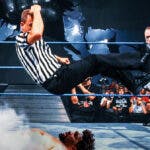History tends to repeat itself.
Grant Hill is a Hall of Famer, but he's perhaps the biggest what-if in NBA history. He had all the talent in the world and was a great player; though held back by injuries. To this day, some say he could've been Michael Jordan.
Joel Embiid is arguably the best center in the NBA today. He has also been crippled by injuries. At this rate, Embiid looks like the Grant Hill of his generation.
When one thinks of Embiid, two things come to mind: injuries and his entertaining social media accounts. Of course, his overpowering skill set comes to mind but not before the chronic weakness in his game.
Joel Embiid suffered a stress fracture in his foot in a pre-draft workout with the Cleveland Cavaliers but was still drafted by the Philadelphia 76ers with the third selection in the 2014 NBA Draft. The Kansas product missed the entirety of his would-be freshman and sophomore NBA seasons due to the foot injury.
Embiid made his NBA debut on October 26, 2016 but played in just 31 games that season due to a knee injury. That said, he was a spectacle and looked well worth the wait in his brief playing time. He was dominating inside, overpowering defenders, and playing at a high level defensively. Those attributes have only improved over his career.
Prior to the NBA hiatus, Embiid never looked better. He was playing inside and outside interchangeably, putting the ball on the floor, hitting the boards at a high rate, and making shrewd passes out of the post. For his career, Embiid is averaging 24.1 points, 11.5 rebounds, 3.1 assists, and 1.8 blocks per game.
You can't teach his game. There are few big men in NBA history who have possessed a complete skill set and produced at an eccentric level from all aspects of the game. Embiid is one of them, and yes, this is over just four years. Unfortunately, that leads to some more cruel facts.
Joel Embiid has appeared in just 202 of a possible 492 games over his six years with the 76ers. Since making his NBA debut he has missed roughly 38 percent of the 76ers' games. In some cases, he has been rested or given days off to stay fresh (ish) so much so that he was given a night off in Game 3 of Philadelphia's first-round series matchup with the Brooklyn Nets last season, as he was dealing with knee pain.
This season he has missed 21 of the 76ers' 65 games. Nights off for rest, knee pain, neck woes, and long-term health continue to headline the big man's career. It's truly a shame, because Embiid is an incredible, mesmerizing player from the eye test and stat sheet.
Grant Hill was an electric, quick, and prolific scorer — in college and the pros. He was slick, got inside with ease, and could pull-up off the dribble, if need be. A four-year player at Duke, Hill made a seamless transition to the NBA with the Detroit Pistons.
From the get-go, Hill made his presence felt with the ball in his hands. Averaging 19.9 points per game he co-won the 1994-95 NBA Rookie of the Year Award alongside Jason Kidd. The legend only grew. Hill increased his point-per-game averages over the next two seasons and then averaged a remarkable 25.8 points per game in the 1999-2000 season.
Then the 21st century commenced.
Hill suffered a devastating ankle injury four games into his debut season with the Orlando Magic (the 2000-01 season) and was forced to undergo season-ending surgery. It only got more heartbreaking. He appeared in just 43 games over the next two seasons and then missed the entire 2003-04 season due to an ankle injury.
Now, Hill returned to the floor and played well in the 2004-05 season, but he was never as productive or impactful as he was pre-2000. He gradually became a role player who teams weren't game-planning for. The explosiveness vanished.
Hill was about as talented as any scorer of his time. Unfortunately, when one thinks of Grant Hill injuries are the first thing that come to mind, not his talent.
Another prime example of a player dominating over a short period of time is Amar'e Stoudemire.
Players were afraid to guard Stoudemire. He was ferocious underneath. He didn't want to dunk on you: he wanted to dunk through you. Across eight seasons with the Phoenix Suns, Stoudemire was one of the best scoring big men in the NBA, averaging 21.4 points per game. He was that same electric scorer — with a reliable midrange game — in his first season with the New York Knicks in the 2010-11 season.
In the latter years of his time in Phoenix there was concern about Stoudemire's knees, as he missed most of the 2005-06 season due to a knee injury, and it remained a talking point as he hit free agency in 2010. Doctors warned the Knicks that he had three years left on his knees; they gave him a five-year, max deal, anyway. Stoudemire began to lose his spring in the 2011-12 season and was never the same. A productive player? Yes, but he lost that explosiveness, as his knees gave in.
At some point, will the lights go out on Joel Embiid? For his sake, he doesn't rely on, nor does he need to sky above the rim to have a profound impact. At the same time, he exerts himself in a multitude of ways on both ends of the floor, attacking the rack and running the floor. At some point, it's going to take its toll with a player who has been hindered by injuries his entire career.
This is a player with Hall of Fame potential. Sure, there are some extraordinary centers in the NBA, whether it be Nikola Jokic, Rudy Gobert, or Karl-Anthony Towns; some would argue that Anthony Davis is a true center. Even if you think that the aforementioned big men are better than Embiid, it's by a hair, and he's a tremendous player from a pure skill set perspective.
Joel Embiid is an elite talent, but we may never see his true potential.




